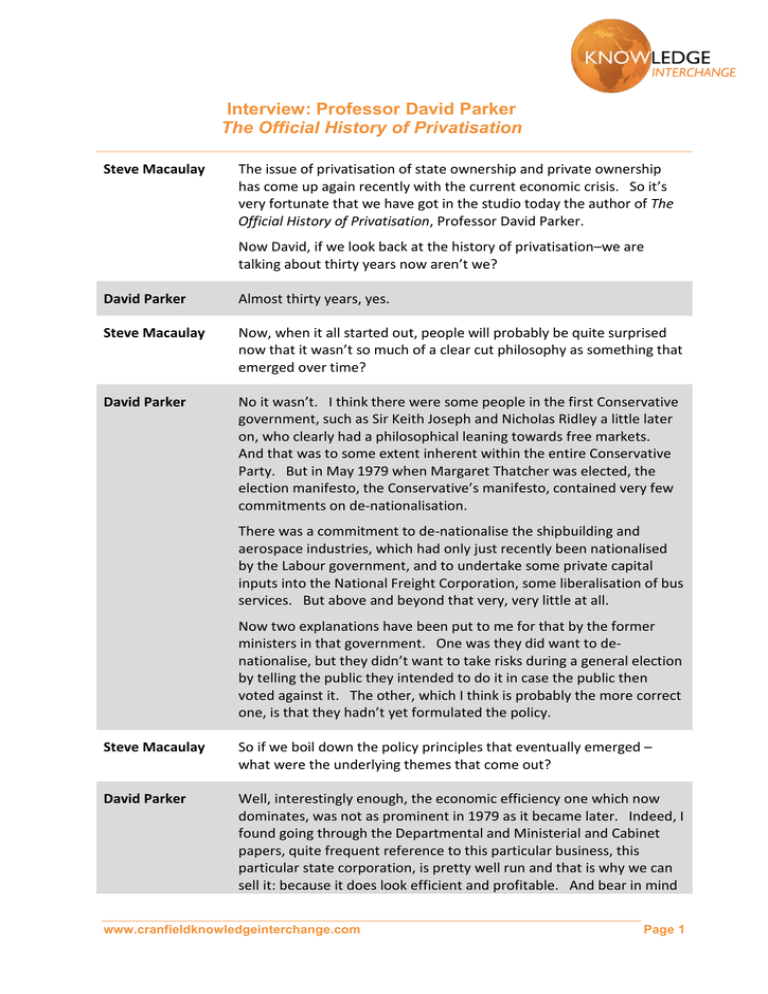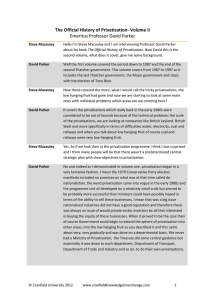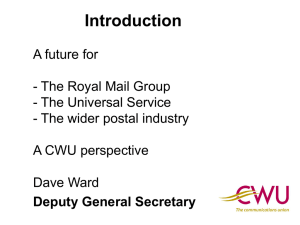Interview: Professor David Parker The Official History of Privatisation
advertisement

Interview: Professor David Parker The Official History of Privatisation Steve Macaulay The issue of privatisation of state ownership and private ownership has come up again recently with the current economic crisis. So it’s very fortunate that we have got in the studio today the author of The Official History of Privatisation, Professor David Parker. Now David, if we look back at the history of privatisation–we are talking about thirty years now aren’t we? David Parker Almost thirty years, yes. Steve Macaulay Now, when it all started out, people will probably be quite surprised now that it wasn’t so much of a clear cut philosophy as something that emerged over time? David Parker No it wasn’t. I think there were some people in the first Conservative government, such as Sir Keith Joseph and Nicholas Ridley a little later on, who clearly had a philosophical leaning towards free markets. And that was to some extent inherent within the entire Conservative Party. But in May 1979 when Margaret Thatcher was elected, the election manifesto, the Conservative’s manifesto, contained very few commitments on de-nationalisation. There was a commitment to de-nationalise the shipbuilding and aerospace industries, which had only just recently been nationalised by the Labour government, and to undertake some private capital inputs into the National Freight Corporation, some liberalisation of bus services. But above and beyond that very, very little at all. Now two explanations have been put to me for that by the former ministers in that government. One was they did want to denationalise, but they didn’t want to take risks during a general election by telling the public they intended to do it in case the public then voted against it. The other, which I think is probably the more correct one, is that they hadn’t yet formulated the policy. Steve Macaulay So if we boil down the policy principles that eventually emerged – what were the underlying themes that come out? David Parker Well, interestingly enough, the economic efficiency one which now dominates, was not as prominent in 1979 as it became later. Indeed, I found going through the Departmental and Ministerial and Cabinet papers, quite frequent reference to this particular business, this particular state corporation, is pretty well run and that is why we can sell it: because it does look efficient and profitable. And bear in mind www.cranfieldknowledgeinterchange.com Page 1 Professor David Parker that the less profitable ones – and some of the loss makers – their denationalisation came much later in the 1980s. In some cases like the railways and coal, well into the 1990s. So the economic efficiency one wasn’t so strong at that time. What were strong issues was first of all the state of the government’s finances; the public finances which were in a terrible state when the Conservative government was elected in May 1979 – certain echoes of what might happen next year, in fact – and the Conservatives wanted to cut taxes. They found it extremely difficult to cut public expenditure. In fact the Conservative governments during the 1980s never cut public expenditure in real terms: they cut its growth, but they didn’t actually cut the real public expenditure. So in the early years of the 1980s the receipts from the sale of government assets were quite important to government. And then the other issue, which was important right from the early stage, was the small shareholder issue of spreading share ownership amongst a larger number of people. And that particular policy was quite successful for a time. Steve Macaulay So if we pick up this issue about successes and failures. With the benefit of hindsight now, would you be able to pick out what you would see as the particular successes and the particular failures? And there maybe some reasons why, too? David Parker Well, some people might object to the term failures. I mean there are some people who think that all of them were successful – it was just the degrees of success. But let’s deal with how you frame the question. The successful ones were undoubtedly companies like Amersham International, the National Freight Corporation, arguably British Aerospace has done well since privatisation on the whole – although it was only in the state sector for a matter of three or four years. The less successful one – or what you might call the failures – possibly questions could be raised about water and sewerage because in that particular industry there is no competition: there wasn’t when it was state owned, effectively there isn’t now in almost all areas of water and sewerage. And the railways. And the railways is of course arguably the most controversial of all. And then I might just chip in – I mean there have been some denationalisations which then went on to fail financially: shipbuilding particularly, private coal mines come immediately to mind. And what that indicates is that they were doing badly under state ownership, private ownership couldn’t save them either – they just went under. www.cranfieldknowledgeinterchange.com Page 2 Professor David Parker Steve Macaulay And of course the general public tended to look on this somewhat askance? David Parker Yes. It is interesting actually that the public in general, when asked about forthcoming privatisations such gas, electricity or water would indicate – very large numbers, usually the majority would indicate that they didn’t support the privatisation. But then of course large numbers, millions of small investors, individuals, then rushed out to buy the shares when they were on offer because they were usually offered at such an attractive price. There was such a prospect of making a quick capital gain by selling the shares when trading in them again on the stock market, that the public was very attracted to those issues. But yes, privatisation of industry generally was probably marginally winning votes for the Conservatives. What was successful was the other aspect of the privatisation programme which we are inclined to overlook in discussions like this, which was the sale of council housing. Council housing was definitely politically very successful for the Conservatives during the 1980s. Steve Macaulay So if we pick up the issue about winners and losers – we have talked about investors, the people that bought council housing – can you identify other groups that won and some that lost? David Parker Yes. One way of approaching this actually is to look at the situation in the 1940s/50s and the kind of underlying values of public policy at that time, compared with the values of the 1980s/90s. In the 1940s and 50s, coming out of the Great Depression and the Second World Ward, and so on, there was very much a thrust in public policy towards equity, fairness, a more equal distribution of income of wealth and arguably perhaps inadequate attention to creating the wealth in the first place. I think what happened in the 1960s and 70s was because of growing economic problems. The 1970s was a particularly bad period for the British economy of course, coming to a crisis during the Winter of Discontent, so called, in 1978/79. But the pendulum swung very much in favour of creating the wealth and if that meant a more unequal society, then so be it. So in answer to your question, undoubtedly privatisation changed the income wealth distribution. The big gainers were, of course, The City – The City made millions, tens of millions and then when it exported its expertise on privatisation overseas in the 1990s, hundreds of millions, from privatisation. Accounting and legal firms did very well because there was a huge amount of documentation that had to be drafted and checked legally between companies, and companies and governments, and so on. www.cranfieldknowledgeinterchange.com Page 3 Professor David Parker Other big beneficiaries, the senior management, because top salaries tended to be depressed in the public sector. We are talking today about MPs and they are of course saying well the reason we are sometimes generous with our expenses claims is because we are not paid enough. Well, in a sense that is carried through to the public corporations in the 80s. Senior management was not well paid, so understandably when these companies were privatised, the salaries went towards market levels for running big companies. Other big gainers – well, of course, some of the big investors who made money on the shares, come immediately to mind. On the losers side, well lower paid labour because the studies that I have done show that the average wage paid by companies after privatisation didn’t change much, but what did change was the distribution between the top and the bottom within the workforce. People towards the lower end, unskilled parts of the workforce, were often more casualised, put into separate companies – there was a lot of outsourcing of activities. And although pensions were by and large protected for the existing employees at privatisation, any new employee afterwards benefitted much less in the sense that the pension was much less attractive. So they were the big losers. And some suppliers. The demise of the British nuclear generating industry, the demise of the British telecommunications supply industry, was a direct result of privatisation. Steve Macaulay Looking back now, it’s over a quarter of a century, have things worked out the way the originators intended? How have things developed? David Parker Well, an interesting question, simply because underlying that is the premise that people thought in the long term at the time when they were undertaking the policy. I think that wasn’t true. The Conservatives were desperate in the 1980s to get rid of the state industries: they were often losing money, although not all of them, but often losing money. They certainly took up a lot of ministerial time and when anything went wrong in the industries it became a political issue rather than simply a business commercial issue. So the Conservative ministers were desperate to get rid of these businesses. And as privatisation became more and more successful in the sense that the businesses were sold successfully, of course more and more candidates for privatisation came up. Did they think in the long term? Did they think what would be the situation in twenty/thirty years? No, I think by and large it wasn’t the case. And I have raised with former ministers the issue of did you take a view, or did you expect, for example, the electricity and water industry might fall largely into foreign ownership – and the attitude was no, we didn’t www.cranfieldknowledgeinterchange.com Page 4 Professor David Parker think about it very much. And when I posed the question well, would it have changed your policies if you knew what we know now? By and large the answer is no, they were so keen to get rid of them. Steve Macaulay So if we look ahead at the next quarter of a century, do you see how the future of privatisation is going to work out? David Parker Well I think we are seeing at the moment, obviously we have seen a number of nationalisations of banks – or technically not nationalisations but state purchasing majority shares in these companies. I don’t think that is a trend. I think what we have seen in this current Labour government is that they have taken over the banks with great reluctance. There is no ideological underpinning as there was in the 1940s for nationalisation. So I don’t see in any of the major political parties at the moment, any great desire to go back to owning state owned industries. What I think will change is that in the 1980s the word industrial policy became almost taboo in government and many political and economic circles. I think we are beginning to see the resurrection of an industrial policy mentality within government at the moment. A view that governments can’t just leave all industries to market forces. And of course one of those that you can’t leave entirely to market forces is the financial system, sometimes called the plumbing of the economy. Steve Macaulay David, there are some really useful insights. Thank you very much. David Parker Thank you. www.cranfieldknowledgeinterchange.com Page 5








